Your Guide to Children’s Vaccinations
Measles, mumps, and other preventable diseases are on the rise. Here's how to keep kids safe.
Updated on February 10, 2023

Whether a child is starting preschool or shuttling off to college, it’s important to put immunizations at the top of their health to-do list. Vaccines not only protect individuals from infectious diseases like measles and mumps, they also help keep families, schools, and communities healthy. Even children who are too young to be immunized, have medical conditions that make vaccinations unsafe, or don't respond well to certain vaccines are better protected if kids around them have immunity.
Though immunization policies and requirements may vary by state or school district, there are several must-have immunizations for most children. Though vaccines are widely considered to be safe and effective, some may cause mild, temporary side effects, such as injection-site tenderness, headaches, tiredness, or low fever.
Allergic reactions are rare, but possible. Any child who exhibits trouble breathing, dizziness, fainting, rapid heartbeat, or low blood pressure should be checked immediately by a healthcare provider (HCP). Vaccines should not be given to kids with a known allergy to any ingredient or to those who have had an allergic reaction to a previous dose.
Visit the childhood immunization schedule from the Centers for Disease Control and Prevention (CDC) and read on for a detailed look at each essential vaccine.
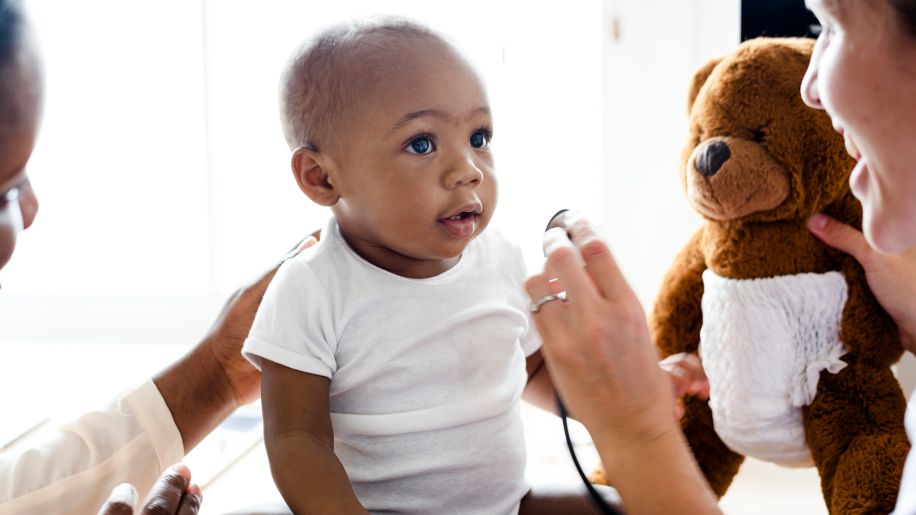
Hepatitis A and B
Why vaccinate: Hepatitis A and hepatitis B are both liver diseases, but they are caused by different viruses. Hepatitis A is an acute infection that can last from a few weeks to a few months. Hepatitis B causes liver inflammation and symptoms like fever, chills, body aches, pale stool, dark urine, and jaundice. Long-term complications include liver failure, liver cancer, or cirrhosis, which can leave the liver permanently scarred. Immunization is especially important during childhood. Adults typically recover fully from exposure to the virus, but it's more likely children will develop a chronic infection.
When to vaccinate: Starting at age 12 months, a child should receive the hepatitis A vaccine in two doses, six months apart. The first dose of the hepatitis B vaccine is given before a newborn is discharged from the hospital. After that, they should get two more doses before the time they are 18 months old.
Certain circumstances can influence when a child should be vaccinated for hepatitis B:
- Healthy infants born to mothers who test negative for the hepatitis B antigen should receive their first dose within 24 hours of birth.
- Newborns with a low birth weight—under 4.4 pounds—will receive their first shot at 1 month or upon being discharged from the hospital.
- The vaccine will be administered within 12 hours of birth to children born to mothers with hepatitis B, regardless of weight.
A pregnant person with hepatitis B can transmit the disease during birth, and up to one-fourth of infected newborns will eventually die from liver disease caused by the virus. Speedy vaccination can help prevent this.
Risks: Most babies don’t have reactions to either of these vaccines. If your newborn or child has a severe allergic reaction to the initial dose, speak with your HCP about whether they should continue with the immunization.
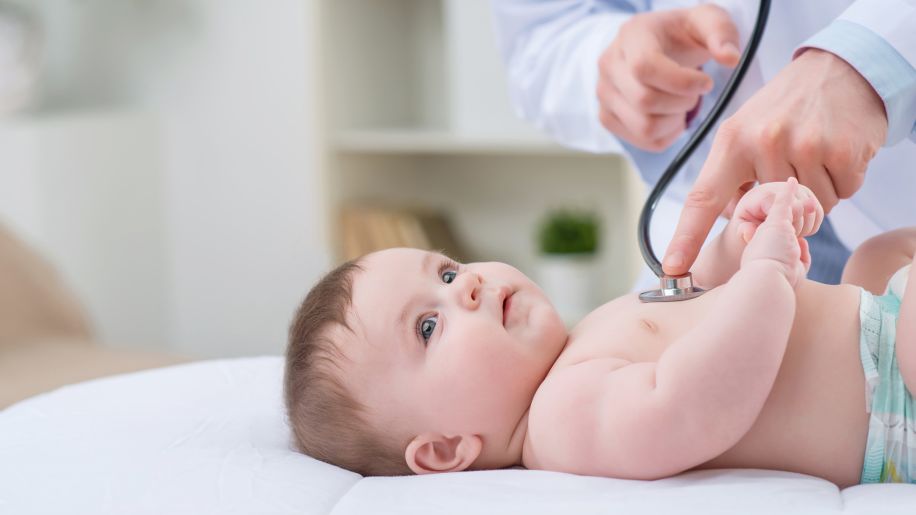
Rotavirus
Why vaccinate: Rotavirus diarrhea usually occurs in babies and young children. In some cases, it can cause dehydration, vomiting, and/or a fever.
When to vaccinate: The first dose of the rotavirus vaccine should be given no later than 15 weeks of age. Experts recommend the doses occur at 2 months and 4 months for the two-dose version of the vaccine and at 2, 4, and 6 months for the three-dose version.
Risks: Most babies won’t experience any side effects. But it’s important to note that the vaccine does not prevent diarrhea caused by other germs. In rare cases, serious side effects such as intussusception (a type of bowel obstruction) and allergic reactions may occur. Babies with a weakened immune system or rare conditions like severe combined immunodeficiency (SCID) or who have had intussusception before should not get the vaccine.

Diphtheria, tetanus, acellular pertussis (DTaP)
Why vaccinate: The DTaP vaccine protects against three serious bacterial diseases:
- Diphtheria is characterized by a thick coating in the back of the throat and can cause breathing trouble, heart failure, and paralysis.
- Tetanus causes muscles to tighten, which can lead to jaw cramping, spasms, seizures, headaches, and changes to blood pressure and heart rate. Complications include trouble breathing, pneumonia, infections contracted during hospital visits, pulmonary embolisms, and even death if left untreated.
- Pertussis, or whooping cough, is a respiratory illness marked by coughing fits that can last for weeks and can prevent infants from eating, drinking, and breathing. Pneumonia, seizures, and brain damage are all possible complications of the condition.
When to vaccinate: Children should receive five doses of the DTaP vaccine between 2 months and 6 years of age, plus a booster known as Tdap between ages 11 and 12. If your child misses a recommended shot, the immunization schedule will change, so it’s important to consult an HCP. Pregnant people should get Tdap to help newborns fend off possible infection.
Risks: Contracting any of the diseases is much worse than getting the vaccine. Kids who are sick with a severe cold or flu should wait to be vaccinated.

Haemophilus influenzae type b (Hib)
Why vaccinate: The Hib vaccine protects against a type of bacteria that can cause meningitis (brain and spinal cord swelling), pneumonia, severe throat swelling, and even death.
When to vaccinate: The bacteria typically affects children under 5 years of age, so immunization is recommended beginning at 2 months. Depending on the specific brand of vaccine, some children may need up to four doses, while others will need three. Children on the three- and four-dose series should receive a shot at 2 months, 4 months, and between 12 and 15 months. Those receiving a fourth shot will also get a dose at 6 months.
Risks: There are a handful of special circumstances that could change vaccination recommendations, such as if a child was born with HIV or is undergoing chemotherapy or radiation therapy. Kids who’ve experienced a severe allergic reaction to one dose of Hib should not get another. Those who are sick at the time of vaccination should wait until they are better before getting the shot.
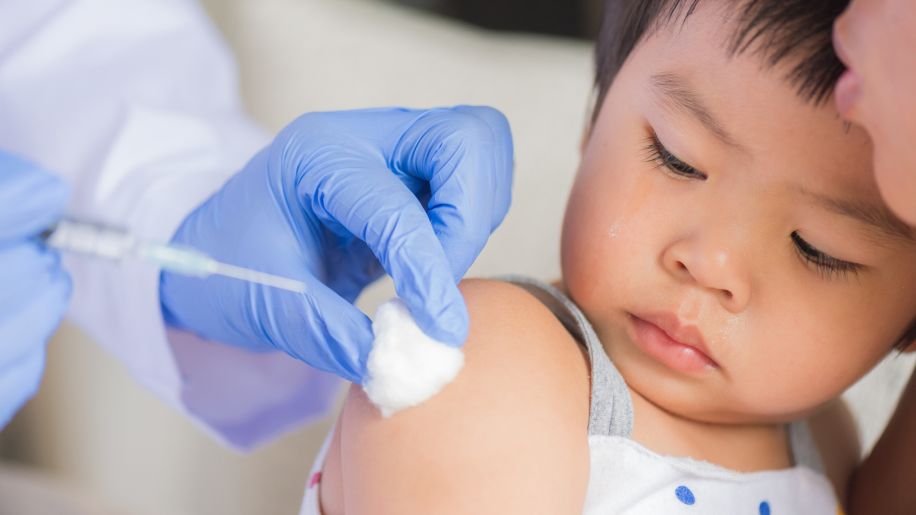
Pneumococcal conjugate
Why vaccinate: Pneumococcal disease commonly causes ear infections and can lead to more serious concerns like lung infections, blood infections, or meningitis. When children with pneumococcal disease develop meningitis, it can cause deafness and brain damage. In about 1 in 12 cases in children, pneumococcal meningitis leads to death.
Before routine use of the pneumococcal conjugate vaccine, the United States recorded an estimated 17,000 cases of pneumococcal disease and 200 related deaths each year among children under 5 years of age. Vaccinations have eliminated about 9 in 10 of these cases.
When to vaccinate: Children under 2 years of age should receive four doses of the pneumococcal conjugate vaccine (also known as PCV13), one each at 2 months, 4 months, 6 months, and between 12 and 15 months. Children who miss recommended doses should still be vaccinated—it's never too late. Speak with an HCP for next steps if a child is behind schedule.
Risks: PCV13 does not cause serious reactions. Some children may experience tenderness or swelling at the injection site or drowsiness, loss of appetite, and a fever.
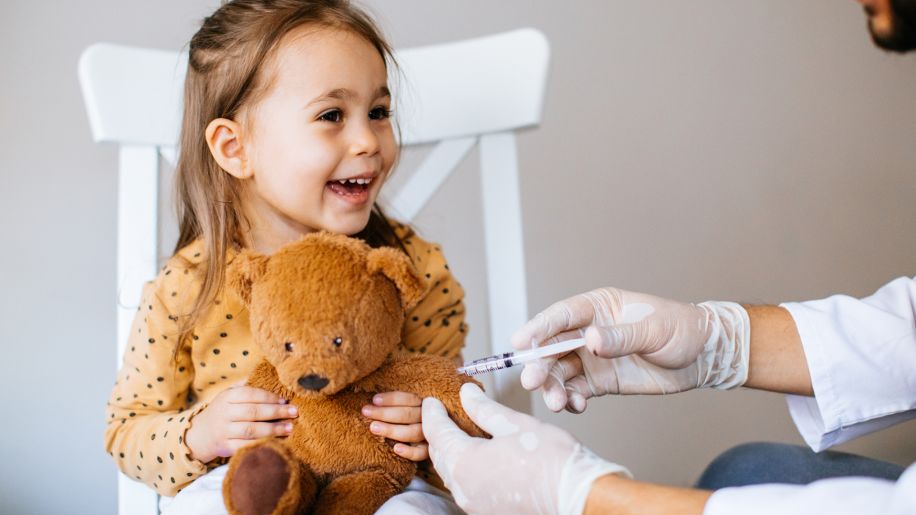
Inactivated poliovirus (IPV)
Why vaccinate: Polio is caused by a virus spread through contact with an infected person or by consuming food contaminated with the stool of an infected person. The poliovirus may cause flu-like symptoms, a stiff neck, and/or pain in the limbs. In rare cases, it can cause paralysis.
Prior to the introduction of the polio vaccine in 1955, the disease killed thousands of Americans each year. While it had been eliminated in the United States for more than four decades, polio made a brief appearance in 2022 when an adult was identified with polio in New York State and wastewater testing suggested additional cases. The disease still affects people in certain countries, making immunizations important.
When to vaccinate: It’s recommended that children be vaccinated against polio with a four-dose series between 2 months and 6 years of age.
Risks: A child should not get the IPV if they are allergic to any part of the vaccine. Like other vaccines, if a child is moderately or extremely sick, they should wait to get vaccinated until they’re feeling better.
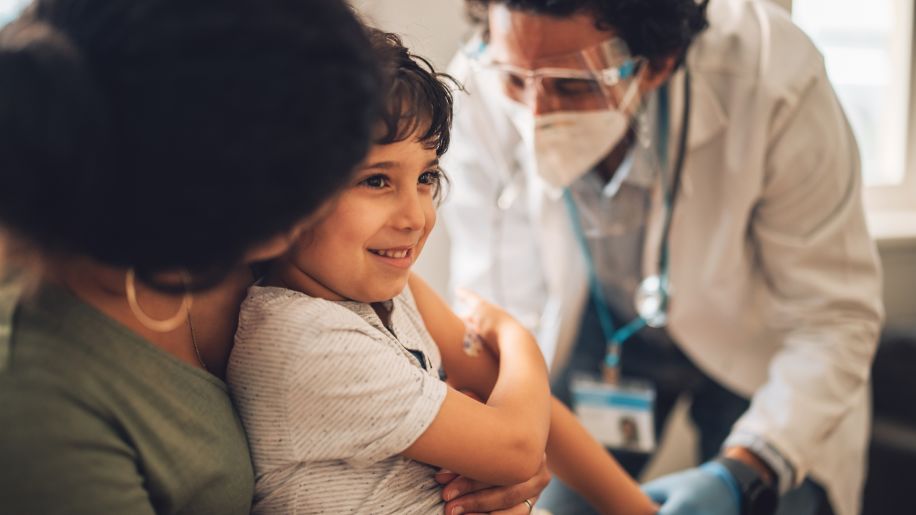
Measles, mumps, rubella (MMR)
Why vaccinate: The MMR vaccine protects against several diseases that are highly contagious and easily spread:
- Measles typically presents with fever, cough, runny nose, and a body-wide rash. The condition can lead to pneumonia, diarrhea, and in rare cases, brain damage.
- Mumps can cause head and muscle aches, fatigue, and inflammation of one or both salivary glands, which are located below the ears on both sides of the face. The virus can also cause brain and spinal cord swelling, deafness, testicular or ovarian swelling, and miscarriage.
- Rubella is characterized by a fever, sore throat, rash, and eye irritation. The condition can increase miscarriage risk and leads to arthritis in nearly half of teen girls and women who contract the disease.
When to vaccinate: Most children should receive two doses of the MMR vaccine—the first between 12 and 15 months and a second between 4 and 6 years of age. Those who miss the recommended age targets should be immunized with two doses at least 4 weeks apart. If a baby who is younger than one year old is traveling abroad, they may get the vaccine but it will not count as part of their routine vaccination.
Risks: The vaccine isn’t suitable for those with a severely weakened immune system caused by HIV/AIDS, cancer, or other medical issues. Tell an HCP if there's a family history of immune disorders, or if a child has a bleeding condition or bruises easily or has received a blood transfusion within the previous 90 days.

Varicella (chickenpox)
Why vaccinate: Chickenpox is a highly contagious disease characterized by fever, fatigue, and itchy blisters covering all or part of the body. Chickenpox is common in the U.S. and usually requires no treatment, but the condition can be uncomfortable. In rare cases, it can lead to infections, dehydration, pneumonia, or brain swelling. Infants whose mothers haven't had the disease or vaccine, children with a compromised immune system, and those taking steroid medications for conditions like asthma are at a higher risk for complications.
When to vaccinate: Children should receive two doses of the varicella vaccine, the first between 12 and 15 months and the second between 4 and 6 years, although the second dose can be given as early as 3 months after the first. While following this immunization schedule is recommended, children of all ages can receive the vaccine. There’s also a combination vaccine called MMRV, which contains both the measles, mumps, rubella (MMR) and varicella vaccines. If a child received the MMRV vaccine, they do not need to get the varicella vaccine separately.
Risks: The varicella vaccine is widely regarded as safe and effective. Parents of children who have certain medical conditions or who take medications that compromise their immune systems should consult an HCP about potential risks.
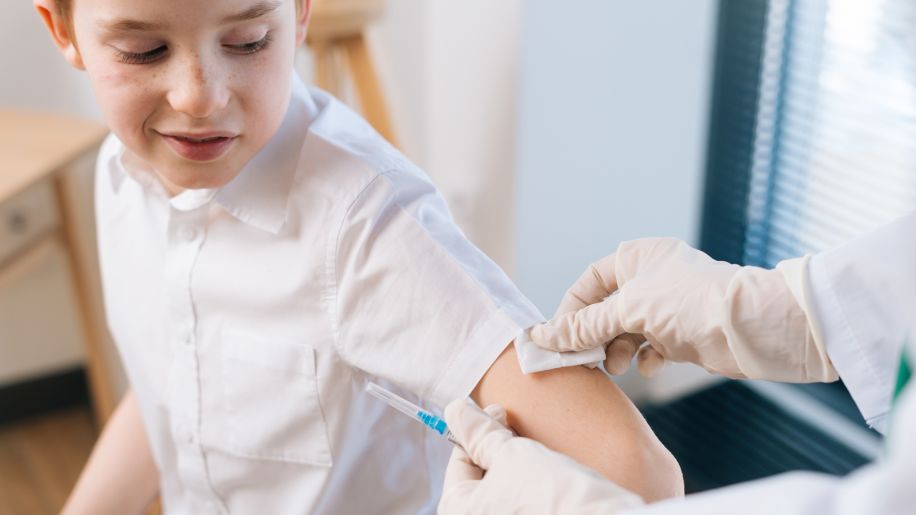
Human papillomavirus (HPV)
Why vaccinate: HPV is considered a sexually transmitted infection (STI), but it’s a good move to vaccinate children so their bodies can build immunity against the disease before they become sexually active. Each year, HPV causes an estimated 37,300 cancers in the U.S., the vast majority of which could have been prevented by the HPV vaccine.
When to vaccinate: It's recommended that all children receive the two-dose vaccine between the ages of 11 and 12. The first dose can be given as early as age 9. If a child receives the vaccine after the age of 15, three doses are recommended. People who have not previously been vaccinated can also receive the vaccine up to age 26, but it’s worth noting that being vaccinated at older ages is less effective for lowering cancer risk. In special circumstances, an HCP may recommend receiving the vaccine up until age 45.
Risks: Side effects are rare, but some may experience mild pain at the injection site or fever, headache, nausea, or dizziness.
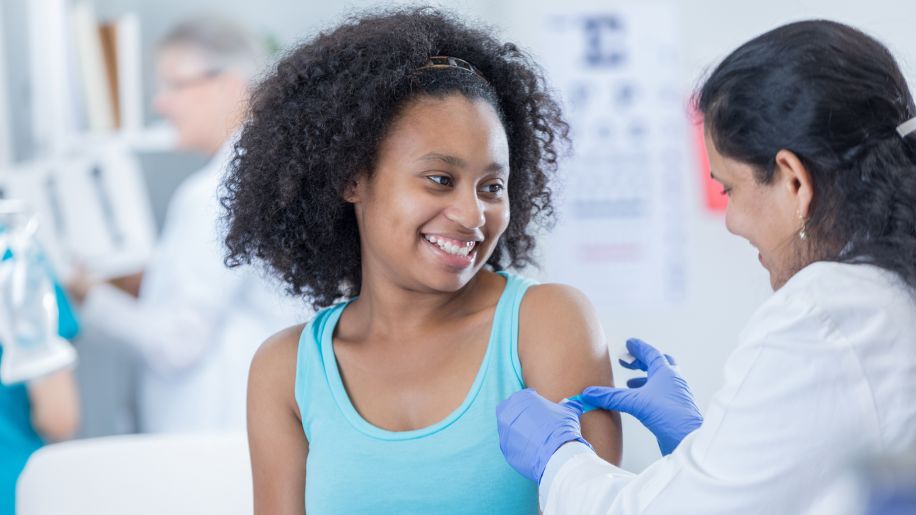
Meningococcal
Why vaccinate: Meningococcal infections are caused by a bacteria called Neisseria meningitidis. Infected people often develop meningitis or a blood infection known as meningococcemia, both of which can become deadly very quickly. In children, symptoms include fever, irritability, lethargy, and poor eating. Even with treatment, 10 to 15 percent of infected people will die, and those who do survive often endure loss of limbs, deafness, or brain damage.
When to vaccinate: To safeguard children, they should be immunized between 11 and 12 years of age with a meningococcal conjugate vaccine and receive a booster shot at 16 years old. Young people between 16 and 23 years may also receive a serogroup B meningococcal vaccine, which can be given at a younger age to those with certain disorders, a damaged or removed spleen, or who are taking certain medications called complement inhibitors (such as eculizumab or ravulizumab).
Risks: Soreness or redness at the injection site is common but lasts just a day or two. Allergic reactions are very rare.
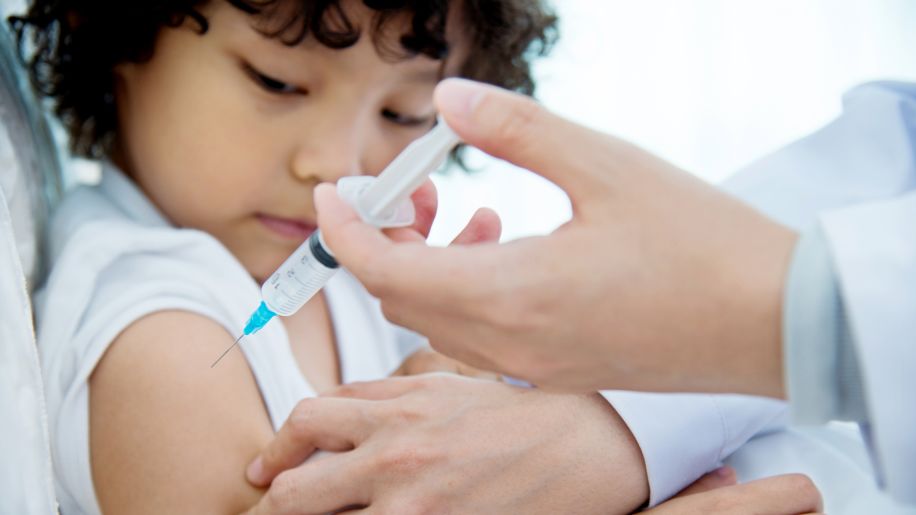
Influenza
Why vaccinate: Anybody can get the seasonal flu, a highly contagious viral respiratory infection that often causes high fever, muscle aches, nasal congestion, sore throat, and a cough. The flu spreads when an infected person coughs, talks, or sneezes.
Thousands of U.S. kids are hospitalized annually for complications related to the flu. Not everyone who catches it will have a severe case of the flu, but children under the age of 5—and especially those under 2 years old—are at higher risk. Having the flu increases the risk for other conditions and complications like pneumonia, bronchitis, sinus infections, and ear infections. Getting the vaccine can help lessen the likelihood of the sickness and ease a child’s symptoms if they do become ill.
When to vaccinate: A yearly flu vaccine is recommended for most people older than 6 months. Kids between 6 months and 8 years of age who are receiving the flu vaccine for the first time should receive two doses separated by at least 28 days. A single dose is recommended every year thereafter. The CDC advises getting the flu vaccine before the end of October, although there is still benefit to being vaccinated any time during flu season.
Risks: The most common side effects include soreness, redness, and swelling near the injection site. Others may experience a low-grade fever, headache, or minor muscle aches, but symptoms usually subside within 1 or 2 days. If a child has an egg allergy, has had allergic reactions to ingredients in the vaccine in the past, or has Guillain-Barré Syndrome, talk with an HCP about options.
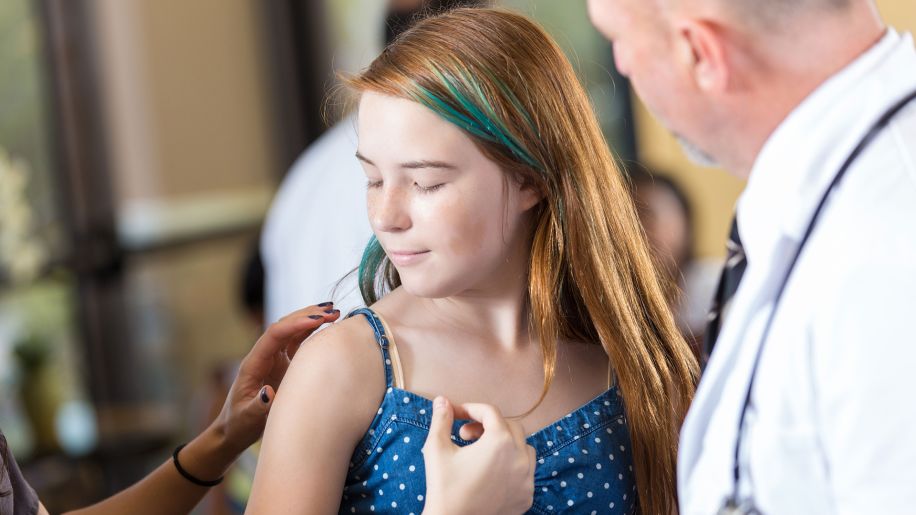
COVID-19
Why vaccinate: More than 1 million Americans have died of COVID-19. As the virus continues to evolve, vaccination remains critical to slowing infection and helping prevent severe disease, hospitalization, and death.
When to vaccinate: The CDC recommends that children receive a two-dose vaccination series of either the Pfizer, Moderna, or Novavax vaccine, plus a booster of either the Pfizer or Moderna bivalent vaccine. (The Pfizer and Moderna shots are available for children 6 months and older, while the Novavax shot is available for those 12 years and older.) Children who have had COVID should still be vaccinated.
Risks: Tens of millions of children have received COVID-19 shots. They are widely regarded as safe and effective and serious complications are rare. Side effects such as arm pain, fatigue, and headache may occur within two days of vaccination but typically clear up quickly. If you have questions about the vaccine’s effectiveness, safety, or necessity, speak with an HCP.
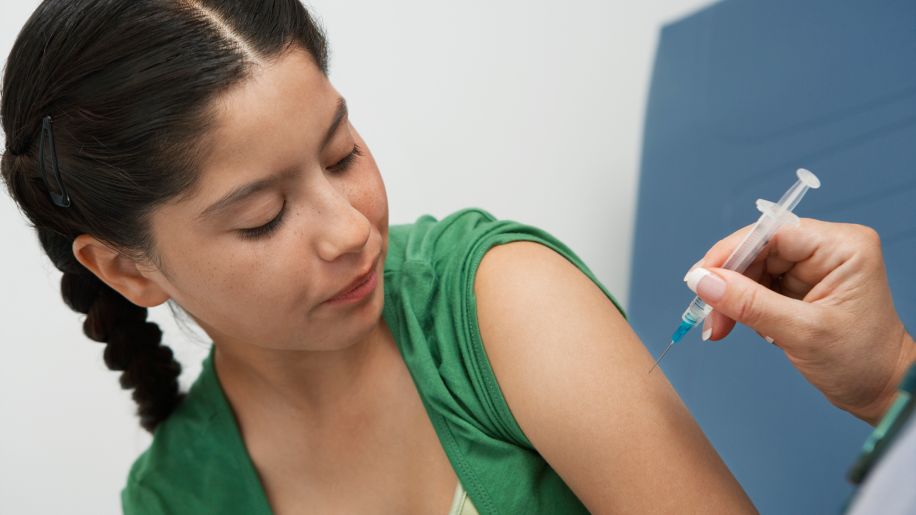
Dengue
Why vaccinate: Dengue is an infection caused by viruses transmitted to people by certain infected mosquitoes (in particular, members of the Aedes species called aegypti or albopictus). Illness can range from mild to life-threatening with symptoms that include nausea, vomiting, rash, and aches and pains. Areas where dengue is endemic (or occurs prevalently) include Puerto Rico, American Samoa, the U.S. Virgin Islands, the Federated States of Micronesia, the Republic of Marshall Islands, and the Republic of Palau.
When to vaccinate: Children ages 9 to 16 living in these areas who have had dengue infection previously should receive three doses of the shots. In Puerto Rico, for example, roughly half of children in that age range have had dengue before and are thus eligible for the shot.
Risks: Anyone getting the dengue vaccine must get a blood test first to confirm a previous infection. Children who get the shot who have not previously had a dengue infection have an increased risk of serious illness and hospitalization if they later get dengue. Otherwise, common side effects of the shot include soreness around the injection site, headaches, and fatigue.

U.S. Department of Health & Human Services. Vaccines Protect Your Community. Content last reviewed April 29, 2021.
Centers for Disease Control and Prevention. Recommended Child and Adolescent Immunization Schedule for ages 18 years or younger. 2022.
Centers for Disease Control and Prevention. Making the Vaccine Decision: Addressing Common Concerns. Last Reviewed: November 25, 2022.
Centers for Disease Control and Prevention. Growing Up with Vaccines: What Should Parents Know? July 2018.
Centers for Disease Control and Prevention. Who Should NOT Get Vaccinated with these Vaccines? Last Reviewed: April 2, 2020.
Centers for Disease Control and Prevention. Hepatitis A Vaccination. Page last reviewed: June 29, 2018.
Centers for Disease Control and Prevention. Hepatitis B Vaccination. Page last reviewed: March 30, 2022.
Centers for Disease Control and Prevention. Viral Hepatitis: Hepatitis B Questions and Answers for the Public. Page last reviewed: March 30, 2022.
Centers for Disease Control and Prevention. Pregnancy and HIV, Viral Hepatitis, STD & TB Prevention: HBV. Page last reviewed: August 11, 2022.
Dusheiko G, Agarwal K, Maini MK. New Approaches to Chronic Hepatitis B. N Engl J Med. 2023;388(1):55-69.
Centers for Disease Control and Prevention. Rotavirus Vaccines. Page last reviewed: March 26, 2021.
Centers for Disease Control and Prevention. Vaccine Information Statements (VISs): DTaP (Diphtheria, Tetanus, Pertussis) VIS. Page last reviewed: August 6, 2021.
Centers for Disease Control and Prevention. Vaccines and Preventable Diseases. Diphtheria, Tetanus & Pertussis Vaccine Recommendations. January 22, 2020.
Centers for Disease Control and Prevention. Tetanus: Symptoms and Complications. Page last reviewed: August 29, 2022.
Centers for Disease Control and Prevention. Vaccine Information Statements (VISs): Haemophilus Influenzae Type b (Hib) VIS. Page last reviewed: August 6, 2021.
Centers for Disease Control and Prevention. Vaccine Information Statements (VISs): Pneumococcal Conjugate VIS. Page last reviewed: February 4, 2022.
Centers for Disease Control and Prevention. Vaccines and Preventable Diseases: Pneumococcal Vaccination. Page last reviewed: January 24, 2022.
Centers for Disease Control and Prevention. Pneumococcal Disease. Symptoms and Complications. Page last Reviewed: May 18, 2022.
Centers for Disease Control and Prevention. Vaccine Information Statements (VISs): Polio VIS. Page last reviewed: August 6, 2021.
Centers for Disease Control and Prevention. Polio Vaccination. Page last reviewed: August 11, 2022.
Centers for Disease Control and Prevention. Global Immunization. Polio Frequently Asked Questions (FAQ). Page last reviewed: August 24, 2022.
Centers for Disease Control and Prevention. Vaccine Information Statements (VISs): MMR (Measles, Mumps, and Rubella) VIS. Page last reviewed: August 6, 2021.
Centers for Disease Control and Prevention. Vaccines and Preventable Diseases: Routine Measles, Mumps, and Rubella Vaccination. Page last reviewed: January 26, 2021.
Centers for Disease Control and Prevention. Vaccines and Preventable Diseases: Chickenpox Vaccination: What Everyone Should Know. Last Reviewed: April 28, 2021.
Centers for Disease Control and Prevention. Chickenpox (Varicella): Prevention and Treatment. Last Reviewed: April 28, 2021.
Centers for Disease Control and Prevention. Vaccine Information Statements (VISs): MMRV (Measles, Mumps, Rubella & Varicella) VIS. Page last reviewed: August 6, 2021.
Centers for Disease Control and Prevention. Vaccine Information Statements (VISs): Haemophilus Influenzae Type b (Hib) VIS. Page last reviewed: August 6, 2021.
Centers for Disease Control and Prevention. HPV Vaccination Recommendations. Page last reviewed: November 16, 2021.
Centers for Disease Control and Prevention. HPV Infection. Page last reviewed: July 23, 2021.
Centers for Disease Control and Prevention. How Many Cancers Are Linked with HPV Each Year? Last Reviewed: October 3, 2022.
Centers for Disease Control and Prevention. Vaccines and Preventable Diseases: Meningococcal Vaccination: What Everyone Should Know. Last reviewed: October 12, 2021.
Centers for Disease Control and Prevention. Meningococcal Disease. Last reviewed: February 7, 2022.
Centers for Disease Control and Prevention. Meningitis: Viral Meningitis. Last reviewed: May 25, 2021.
Centers for Disease Control and Prevention. Influenza (Flu): Key Facts About Influenza (Flu). Last Reviewed: August 26, 2021.
Centers for Disease Control and Prevention. Influenza (Flu): Information for Schools & Childcare Providers. Last Reviewed: October 15, 2021.
Centers for Disease Control and Prevention. Influenza (Flu): Who Should and Who Should NOT Get a Flu Vaccine. Last Reviewed: August 24, 2021.
Centers for Disease Control and Prevention. Influenza (Flu): Flu Vaccines are Important for Children. Last Reviewed: November 30, 2022.
Centers for Disease Control and Prevention. COVID-19: COVID-19 Vaccine Safety in Children and Teens. Last Updated: July 20, 2022.
Centers for Disease Control and Prevention. COVID-19: Stay Up to Date with COVID-19 Vaccines Including Boosters. Last Updated: January 25, 2023.
Centers for Disease Control and Prevention. Dengue Vaccine. Page last reviewed: December 16, 2021.
Centers for Disease Control and Prevention. Dengue: Dengue Vaccine. Page last reviewed: December 16, 2021.
Centers for Disease Control and Prevention. Dengue: Reasons to Get Vaccinated. Page last reviewed: December 16, 2021.
Centers for Disease Control and Prevention. Dengue: Vaccine Safety & Effectiveness. Page last reviewed: December 16, 2021.
Centers for Disease Control and Prevention. Dengue: Dengue in the US States and Territories. Page last reviewed: August 19, 2022.
Featured Content


video

article

slideshow
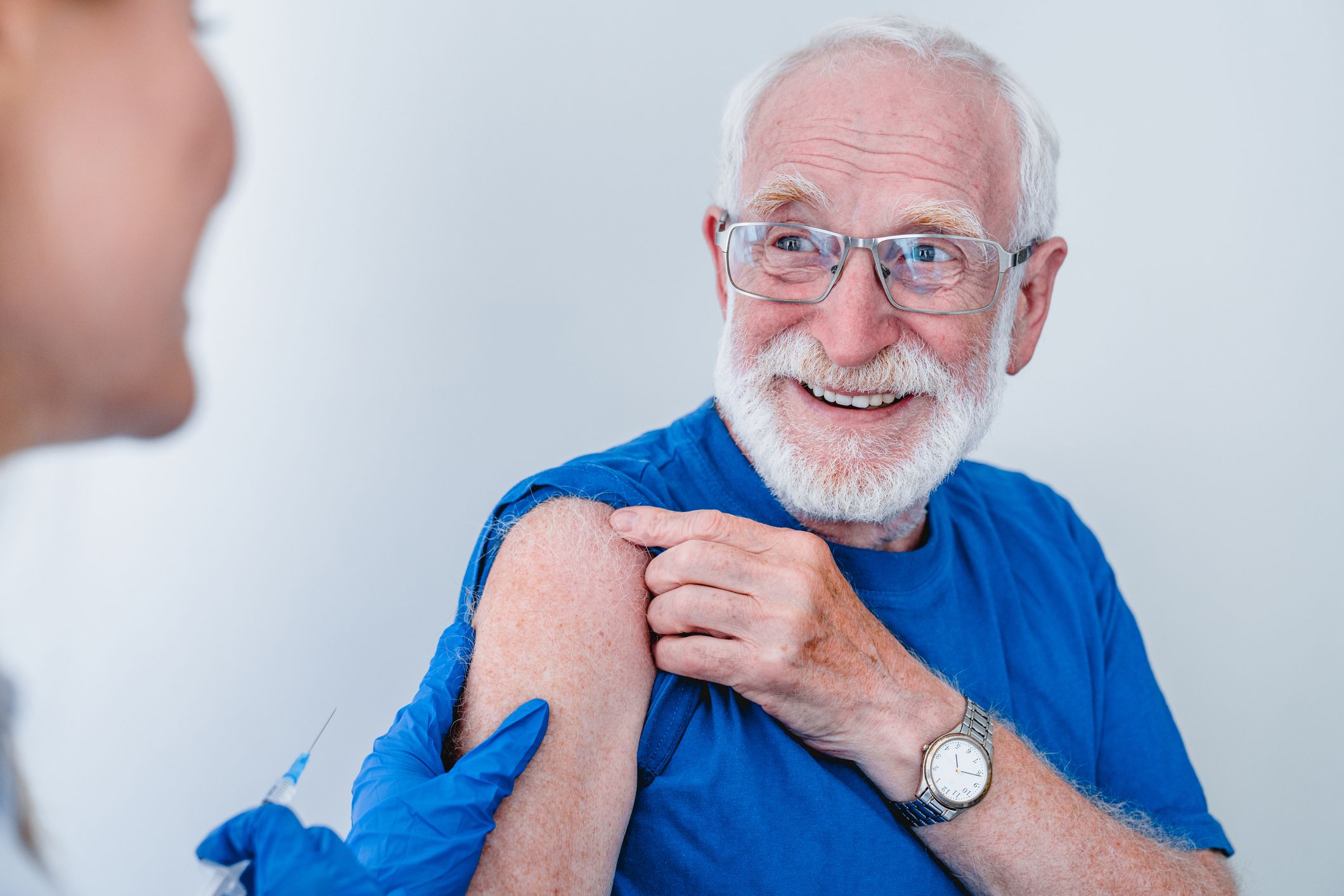
article

article
